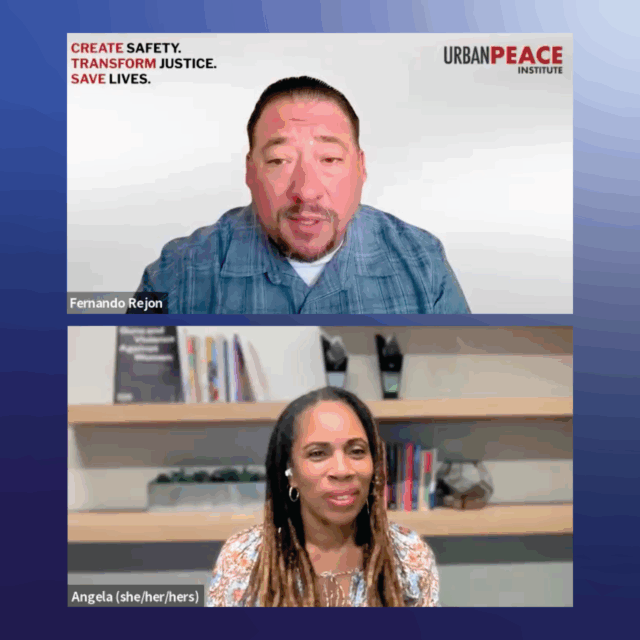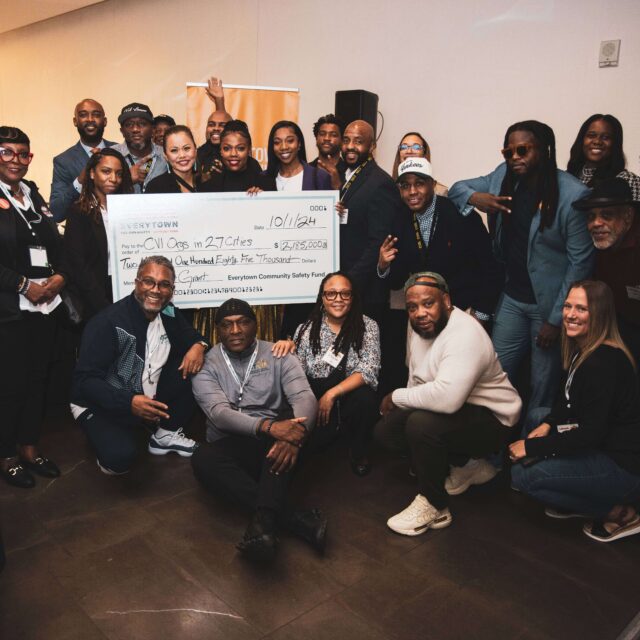How Everytown’s Community Safety Fund Grantees Prevent Gun Violence

8.9.2022
The Everytown Community Safety Fund is excited to support the local, community-based violence intervention programs that have been proven to work—with funding, peer convenings, capacity building, and advocacy support. Violence intervention programs provide community-informed, comprehensive support to people who are most at risk of gun violence and are shown to reduce gunshot woundings and deaths in the communities most-impacted by gun violence.
In 2021, we pledged to give $25 million dollars to support community violence organizations and programs. As of August 2022, the Everytown Community Safety Fund has granted $7.15 million dollars in support to 72 community-based violence intervention programs in over 57 cities across the country. Right now, we’re supporting 30 organizations implementing strategies that work in their 28 communities.
What are community violence intervention programs?
Community-based violence intervention programs apply a localized approach to gun violence prevention. Violence intervention programs deploy trusted and credible community members to identify those who are at the highest risk and work to reduce violence through targeted interventions. There are several program models being used across the country.
Street Outreach
Street Outreach Programs or the Cure Violence Model send street outreach workers and violence interrupters, usually people from the community with their own history with gun violence, to help prevent shootings by identifying risk and immediately mediating conflicts in a community and working with individuals most at risk to address longer-term challenges through case management and services.
Youth Development & Mentorship
Local investments in youth programs are critical to creating opportunities for young people to stay safe, navigate the trauma of being impacted directly or vicariously by gun violence, earn needed income, and build leadership skills that will benefit them and their communities in the years to come. Youth focused art therapy, trauma counseling, summer camps and leadership development programs create safe spaces where youth can raise their awareness about gun violence, access resources and supports and create common bonds with other young people, all of which serve as protective factors that improve life outcomes for participants.
Place-Based Approach
The environment in which we grow up, live, work, and grow old can have a major influence on our individual actions, and research increasingly shows this has implications for reducing gun violence. Violence can be discouraged by these visible signs that a community is cared for and watched over. Crime Prevention Through Environmental Design (CPTED) initiatives can help reduce crime by modifications to the physical city. These initiatives include such activities as cleaning vacant lots, greening parks, restoring or demolishing abandoned buildings, adding lighting to public spaces, and many other ways of investing in our communities and providing livable and green spaces in which community members feel safe, thereby discouraging and reducing gun violence.
Group Violence Intervention
Group Violence Intervention Programs (GVIP)—also referred to as focused deterrence programs—identify those at highest risk of violence and host “call ins,” whereby members of law enforcement, community-based organizations, and at-risk individuals themselves come together to acknowledge that existing approaches have not worked, send the message that stronger enforcement will be applied if the violence persists, and offer extensive social services and support if they choose to move away from violent crime.
Hospital-based Violence Intervention Programs (HVIPs)
Hospital-based Violence Intervention Programs are typically located in trauma centers and emergency departments of hospitals where service providers partner with patients and families immediately in the hospital and during the months that follow a violent injury (such as a gunshot wound). These programs provide the in-hospital support and subsequent community-based case management necessary for survivors to heal, prevent retribution and retaliation, and remain safe.
Meet the Community Violence Intervention Programs We’re Funding in 2022
In light of the critical role community-based violence intervention organizations have played in response to gun violence incidents for decades, the effectiveness of their strategies, and their unique station at the intersection of community and public safety—which has fueled their life-saving efforts amidst persistent gun violence—the Everytown Community Safety Fund will invest $1,500,000 in 15 new, community-based 501(c)3 violence intervention organizations this year. These organizations implement street outreach, hospital-based violence intervention and youth development & counseling programs in 14 cities nationwide, including our first investments in Brooklyn, North Charleston, Denver, Las Vegas, Madison, Miami and San Antonio.
GRASP – HVIP and Street Outreach in Denver, Colorado
GRASP (Gang Rescue and Support Project) is a peer-run, intervention program that works with young people who are at-risk of violence by using credible messengers who are ‘ex-gang members. One of their programs, AIM (At-Risk Intervention Mentoring), is Denver Health and UCHealth’s hospital-based violence intervention program which also provides support and healing circles, youth leadership development programs and more. Read more about their work.
Focused Interruption – HVIP in Madison, WI
Focused Interruption is a non-profit focused on evidence-based solutions to end gun violence in Madison, WI. The staff, who are typically from the neighborhoods they serve, work to interrupt generational trauma and provide support, services, and guidance to victims and their families. Read more about their work.
Yaay Me Inc. – Street Outreach in Washington, DC
YAAY ME, INC. (YMI) offers a variety of programs, workshops and support to youth, young adults, returning citizens and residents of Washington, DC. YMI participates in the Cure the Streets (CTS) program to provide gun violence intervention and prevention through public safety programming and a local Safe Passage program to identify locations in and around school zones where support staff can assist with keeping students and families safe as they travel to and from school. Read more about their work.
TraRon Center – Youth Development & Mentorship in Washington, DC
The TraRon Center works to expose youth gun violence survivors to creative therapeutic modalities to assist with grieving and coping. With a focus on the inclusion of creative arts, TraRon Center equips survivors with strategies to healthfully endure the complexities of loss- while promoting community health and solidarity. Read more about their work.
Not Another Child, Street Outreach and Youth Development & Mentorship in Brooklyn, NY
Through programs, workshops, and events, Not Another Child provides reactive and proactive support, offering wholeness and healing through unconventional therapeutic support services to those that have experienced a violent and/or traumatic event. Programming also emphasizes mentoring, youth engagement, and aiding the development of boys who are at-risk of future gun violence. The Executive Director and Visionary of Not Another Child Inc. (NAC), Onesa Napper-Williams also collaborates with a deep network of credible messengers across New York City to provide wrap-around care. Oresa is a mother, activist, and survivor herself. Read more about their work.
Circle of Brotherhood – Street Outreach in Miami, Florida
The Circle of Brotherhood is an organization of primarily Black men from all walks of life dedicated to community service, economic development, crime prevention, and conflict resolution. This includes a close-touch mentorship program and an increasing focus on street outreach work. Read more about their work.
Turning the Tide – HVIP in North Charleston, South Carlina
“Turning the Tide” is the hospital-based violence intervention program at the Medical University of South Carolina (MUSC). Workers at MUSC Health offer assessment, support, wrap-around services, referrals, and long-term follow-up to individuals at risk of violence, and victims of violent injuries and their families. Read more about their work.
Big Mama’s Safe House – Street Outreach in San Antonio, Texas
Big Mama’s Safe House is a grassroots non-profit organization on San Antonio’s Eastside. Its founder, Bennie Price, was incarcerated for murder as a young man. Upon release from prison, he committed himself to bringing peace to his community. The Safe House’s mission is to reduce gun violence among Black and brown youth and young adults through education, mediation, and intervention, and to alleviate root causes of gun violence such as housing and food insecurity, lack of job opportunities, and mental health support. Read more about their work.
Nevada Partners – Youth Development & Mentorship in Las Vegas, Nevada
The Nevada Partners Positive Youth Impact Program motivates and supports young people to achieve their maximum potential through a holistic programmatic approach. The program assists young people in building a strong educational foundation to ensure graduation from high school. The young people begin their journey in leadership development and civic engagement, and explore career options through work readiness training and career exposure activities. Read more about their work.
The Build Program – Street Outreach in Los Angeles, California
The BUILD Program provides targeted violence prevention and gang intervention, high-risk incident response, comprehensive public safety training, community mobilization, and cooperative activism. The program has deep roots in Los Angeles, but has expanded to numerous cities across the globe. Read more about their work.





